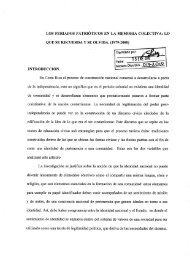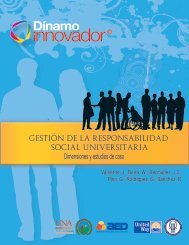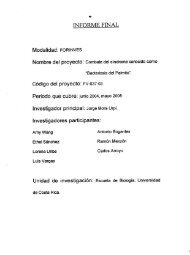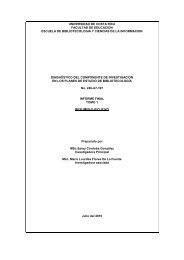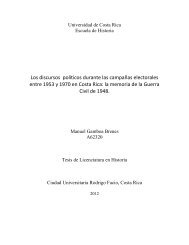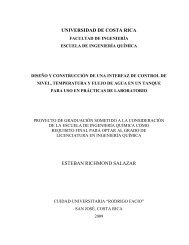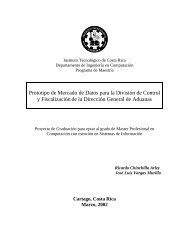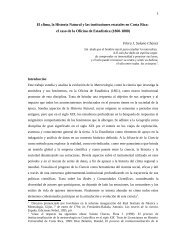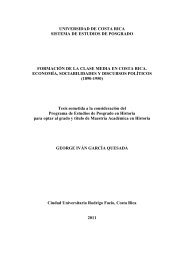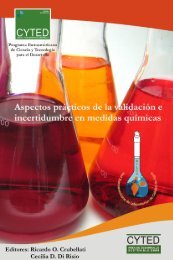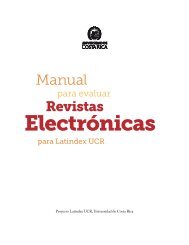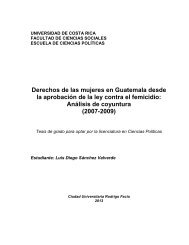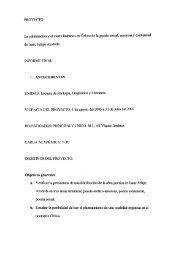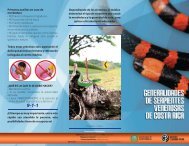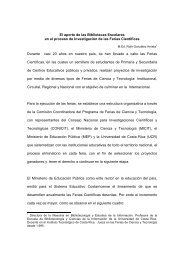A Raisin in the Sun
A Raisin in the Sun
A Raisin in the Sun
You also want an ePaper? Increase the reach of your titles
YUMPU automatically turns print PDFs into web optimized ePapers that Google loves.
RUTH YOUNGER: THE POWERLESS HOUSEWIFE?<br />
MacK<strong>in</strong>non has called female power “a contradiction <strong>in</strong> terms, socially speak<strong>in</strong>g” (1987: 53). If<br />
her assertion is true, no woman has power of any form. However, her idea comes <strong>in</strong>to question when one<br />
analyzes <strong>the</strong> power relations of Ruth with <strong>the</strong> o<strong>the</strong>r women <strong>in</strong> A <strong>Rais<strong>in</strong></strong> <strong>in</strong> <strong>the</strong> <strong>Sun</strong>. At a first glance, Ruth<br />
appears to be <strong>the</strong> woman with <strong>the</strong> least power –or <strong>the</strong> woman who utterly lacks power <strong>in</strong> any form– if<br />
compared to Beneatha and Lena. While Beneatha is a liberated woman and Lena is <strong>the</strong> head of <strong>the</strong><br />
Younger family, Ruth has totally assimilated <strong>the</strong> discourse of patriarchy. For Ruth, a woman's happ<strong>in</strong>ess<br />
comes from marry<strong>in</strong>g a rich man. This is evident when Beneatha's hesitation about a possible marriage<br />
with George Murchison surprises her: “You mean you wouldn't marry George Murchison if <strong>the</strong> asked you<br />
someday? That pretty, rich th<strong>in</strong>g? Honey, I knew you was odd–” (Hansberry, 1988: 49). Ruth's level of<br />
literacy is basic, which can be expla<strong>in</strong>ed as a product of patriarchal discourse on her: she does not th<strong>in</strong>k it<br />
necessary for a woman to pursue educational goals if all she needs to do is f<strong>in</strong>d<strong>in</strong>g a man who will take care<br />
of her. Ruth appears, thus, a totally helpless victim of patriarchal oppression, especially tak<strong>in</strong>g <strong>in</strong>to account<br />
Patricia Hill's idea of “<strong>in</strong>terlock<strong>in</strong>g systems of oppression”. She expla<strong>in</strong>s this idea as follows:<br />
The notion of <strong>in</strong>terlock<strong>in</strong>g oppressions refers to <strong>the</strong> macro-level connections l<strong>in</strong>k<strong>in</strong>g systems of oppression such as<br />
race, class, and gender. This is <strong>the</strong> model describ<strong>in</strong>g <strong>the</strong> social structures that create social positions. [...] Second, <strong>the</strong><br />
notion of <strong>in</strong>tersectionality describes micro-level processes –namely, how each <strong>in</strong>dividual and group occupies a social<br />
position with<strong>in</strong> <strong>in</strong>terlock<strong>in</strong>g structures of oppression described by <strong>the</strong> metaphor of <strong>in</strong>tersectionality. Toge<strong>the</strong>r <strong>the</strong>y shape<br />
oppression (Hill, 2002: 82).<br />
Due to <strong>the</strong> apparently unprivileged position Ruth has as a result of <strong>the</strong>se <strong>in</strong>terlock<strong>in</strong>g systems of<br />
oppression and <strong>the</strong>ir strong <strong>in</strong>fluence on her, Ruth even lacks <strong>the</strong> vision to realize her victimization. In this<br />
light, one could expect Ruth to feel <strong>in</strong>ferior to Beneatha or to admire her because of <strong>the</strong> latter's high<br />
literacy level. Also, one could expect Ruth to accept Beneatha's authority over her s<strong>in</strong>ce Beneatha is <strong>in</strong><br />
college and is more knowledgeable. Similarly, Ruth might be expected to follow Lena's every word<br />
without question<strong>in</strong>g it, due to Lena's experience <strong>in</strong> life. However, this does not happen because Ruth<br />
actually feels entitled to criticize Beneatha, sees her as <strong>in</strong>ferior, and is even powerful enough to confront<br />
Lena directly.<br />
Although Ruth may be expected to somehow acknowledge Beneatha's power over her, <strong>in</strong> reality she<br />
feels superior to her sister <strong>in</strong> law. Ruth demonstrates her power over Beneatha by us<strong>in</strong>g language as a<br />
dom<strong>in</strong>ation tool: Ruth freely criticizes Beneatha and uses belittl<strong>in</strong>g words when referr<strong>in</strong>g to her sister <strong>in</strong><br />
law. Ruth criticizes Beneatha <strong>in</strong> front of Lena: “You ask me, this child a<strong>in</strong>'t sweet on nobody but herself –<br />
Saravia Vargas, José Roberto. "From Power-over to Power-to: Power Relations of Women <strong>in</strong> Hansberry's A <strong>Rais<strong>in</strong></strong> <strong>in</strong> <strong>the</strong> <strong>Sun</strong>"<br />
Impossibilia Nº4, Págs. 34-51 (Octubre 2012) Artículo: Recibido 08/02/2012 - Aceptado 20/03/2012 - Publicado 30/10/2012<br />
43



